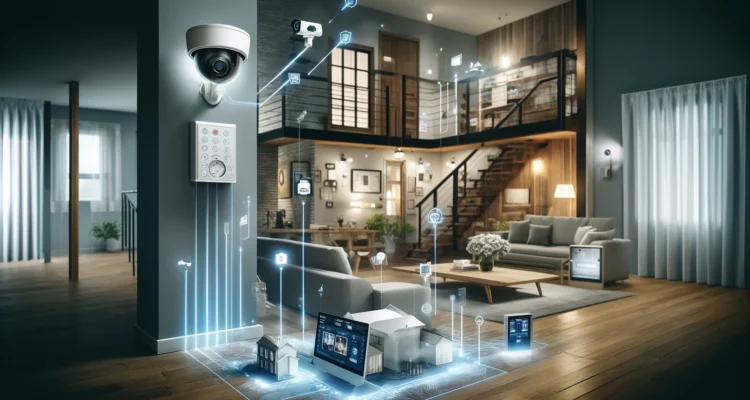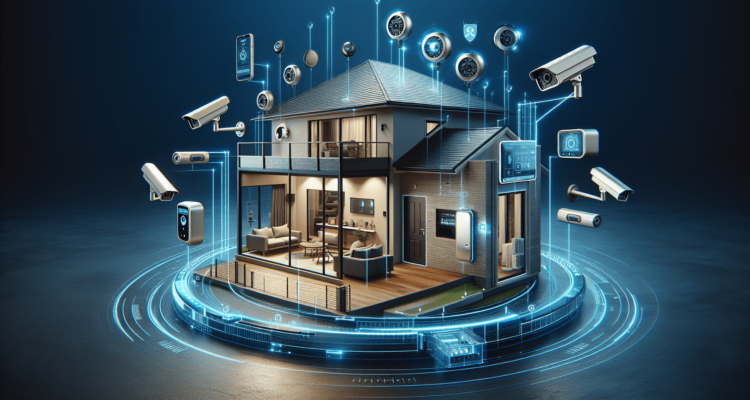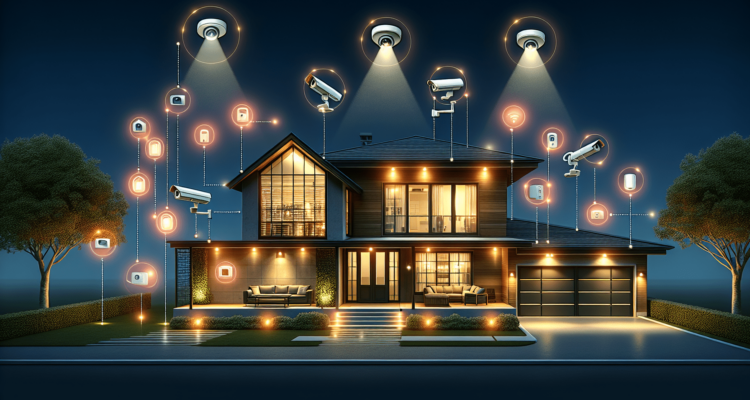Home Security Inspection
Embarking on a journey to ensure the safety of your home and loved ones is a significant step, and with the Home Security Assurance Inspection, you’re poised to secure not just your possessions but your peace of mind. This thorough inspection covers every aspect of home safety, from the strength of your doors to the intricacies of your daily routines, ensuring no stone is left unturned in safeguarding your sanctuary. By humanizing the process and integrating innovative solutions tailored to your lifestyle, it empowers you to live fearlessly, backed by the confidence of proactive protection measures. Embrace the freedom of a securely fortified home, where your family can thrive in safety and comfort, knowing you’re always steps ahead in a constantly evolving world.
Understanding the Basics of Home Security
Defining Home Security
Home security is about more than just alarms and locks. It encompasses a wide array of measures designed to protect your home and its inhabitants from a variety of threats, including burglary, fire, and environmental hazards. A secure home offers a sanctuary where you and your loved ones can feel truly safe, ensuring peace of mind and a sense of well-being.
The Importance of a Secure Home
A secure home is not just a luxury; it’s a necessity. It’s the foundation upon which your family’s safety and peace of mind rest. Knowing that your residence is equipped to protect against threats not only helps to safeguard your valuables but also ensures the personal safety of everyone under your roof. Furthermore, a well-secured home can deter potential intruders, significantly reducing the likelihood of burglary and vandalism.
Differences Between Passive and Active Security Measures
When considering home security, it’s essential to distinguish between passive and active measures. Passive security measures, such as strong doors, locks, and secure windows, are designed to physically prevent unauthorized access. On the other hand, active security measures, such as alarm systems and surveillance cameras, detect intrusions and alert homeowners or authorities. Both are crucial for a comprehensive security strategy, but knowing how they differ can help you tailor your home security to fit your specific needs.
Pre-Inspection Preparation
Creating a Checklist of Areas to Inspect
Before conducting a home security inspection, it’s helpful to create a checklist of areas to inspect. This list should include all potential entry points such as doors and windows, the perimeter of your property, internal security measures like locks and safes, and any technological security solutions you have in place. A thorough checklist ensures no aspect of your home’s security is overlooked during the inspection.
Understanding What Inspectors Look For
Home security inspectors examine your home for vulnerabilities that could be exploited by intruders or pose a risk to the inhabitants. They look at the strength and integrity of doors and windows, the effectiveness of locks and security systems, and the presence of fire safety measures, among other things. Understanding these focal points can help you prepare for the inspection and address any issues beforehand.
Setting Realistic Expectations for the Inspection Process
It’s important to have realistic expectations about the home security inspection process. While inspectors can provide invaluable insights and recommendations, securing your home is a continuous effort that may require time and investment. The inspection is a crucial step in identifying vulnerabilities, but implementing the recommended changes is key to improving your home’s security.
Exterior Security Assessment
Evaluating the Strength of Doors and Locks
The strength of your doors and locks is your first line of defense against intruders. Inspectors will check for solid, sturdy doors with deadbolts and reinforced frames. High-quality, well-maintained locks are essential for securing your home effectively.
Checking Window Security and Integrity
Windows can be vulnerable points in your home’s security. Inspectors will examine the integrity of window frames and glass and assess the effectiveness of locks and other security measures. Ensuring windows are secure and in good repair is crucial to preventing unauthorized entry.
Assessing the Perimeter and Fencing
The perimeter of your property plays a significant role in your home’s overall security. Fencing should be high enough to deter intruders and in good repair. Gates should be secure and equipped with sturdy locks. An assessment of the perimeter helps identify any weaknesses that could give easy access to potential intruders.
Inspecting Outdoor Lighting for Security Purposes
Proper outdoor lighting can significantly enhance your home’s security by deterring intruders and improving visibility. Inspectors will check for well-placed, functional lighting, especially around entry points and pathways, to ensure your property is adequately illuminated.
Interior Security Measures
Reviewing Internal Locks and Deadbolts
Inspectors will review the condition and effectiveness of internal locks and deadbolts. Secure, high-quality locks on all doors, including those between attached garages and the main living area, are crucial for preventing access to your home.
Inspecting the Condition and Placement of Smoke Detectors and Carbon Monoxide Alarms
A comprehensive security inspection also considers fire safety and environmental hazards. The placement, condition, and functionality of smoke detectors and carbon monoxide alarms are examined to ensure they provide adequate protection for your home’s inhabitants.
Evaluating Safes and Secure Storage Solutions
For valuables and important documents, secure storage solutions, such as safes, are essential. Inspectors will evaluate the condition and security features of any safes or secure storage areas in your home, ensuring your valuables are well-protected.
Technological Security Solutions
Understanding Smart Locks and Keyless Entry Systems
Smart locks and keyless entry systems offer convenience and enhanced security features. Inspectors will assess these systems for vulnerabilities and ensure they’re integrated effectively with your home’s overall security strategy.
Assessing Surveillance and Monitoring Systems
Surveillance cameras and monitoring systems play a key role in active home security. Inspectors will evaluate the coverage, quality, and functionality of these systems, ensuring they provide comprehensive monitoring and deterrence capabilities.
Integrating Security Systems with Smart Home Technology
Integrated security systems that work with smart home technology can offer advanced protection and convenience. Inspectors will explore how well your security systems are integrated with other smart home devices, recommendations for enhancements, and ensure user-friendly operation.
Ensuring Safety Beyond Burglary
Fire Safety Inspections
In addition to burglary prevention, fire safety is a critical component of home security. Inspectors will assess fire escape routes, the presence and condition of fire extinguishers, and other fire prevention measures in your home.
Evaluating Emergency Escape Plans
Having a well-thought-out emergency escape plan is crucial for your family’s safety. Inspectors can provide guidance on creating effective escape plans, considering various scenarios and ensuring all family members are prepared.
Inspecting for Environmental Hazards
Environmental hazards, such as gas leaks or electrical risks, can pose significant threats to your home’s security. Inspectors will check for these potential hazards, offering recommendations for mitigation and prevention.
Humanizing Home Security
Customizing Security to Fit Your Lifestyle
A “one size fits all” approach doesn’t work for home security. Inspectors understand the need to customize security measures to fit your lifestyle, taking into account your daily routines, family dynamics, and specific concerns.
Ensuring Security Measures are User-Friendly
It’s crucial that security measures are not only effective but also user-friendly. Inspectors will assess the ease of use and accessibility of your home’s security features, ensuring they enhance rather than hinder your daily life.
Adapting Security to Household Routines
Adapting security measures to fit your household’s routines can significantly enhance their effectiveness. Inspectors will consider how your family uses the space and offer recommendations for integrating security measures seamlessly into your daily life.
Innovative Security Concepts
Exploring Cutting-edge Security Technologies
The world of home security is constantly evolving, with new technologies offering enhanced protection. Inspectors stay abreast of the latest developments, exploring cutting-edge security technologies that could benefit your home.
Implementing Internet of Things (IoT) for Home Security
The Internet of Things (IoT) has opened up new possibilities for home security, allowing devices to communicate and provide comprehensive protection. Inspectors can advise on effective IoT solutions that leverage connectivity for enhanced security.
Investing in AI-Powered Security Solutions
Artificial intelligence (AI) offers advanced features like facial recognition and unusual activity alerts for home security systems. Inspectors can explore AI-powered security solutions that offer sophisticated monitoring and detection capabilities.
Proactive Measures and Prevention
Identifying and Mitigating Potential Threats
Part of securing your home involves identifying and mitigating potential threats before they materialize. Inspectors can help you recognize vulnerabilities in your home’s security and recommend proactive measures to address them.
Recommending Strategies for Risk Reduction
By recommending strategies for risk reduction, inspectors can guide you in fortifying your home against potential threats. This may include upgrading security features, altering routines, or enhancing surveillance and monitoring.
Educating on the Importance of Regular Security Updates
Keeping your home’s security features up to date is crucial for ensuring effective protection. Inspectors will emphasize the importance of regular updates and maintenance, advising on best practices for keeping your security systems at peak performance.
Post-Inspection Follow-up
Setting Up a Schedule for Regular Inspections
After the initial inspection, setting up a schedule for regular security assessments can help in maintaining a high level of protection. Inspectors can advise on an appropriate timeline for subsequent inspections, considering the specific needs of your home.
Resources for Further Learning and Support
Post-inspection, inspectors can provide resources for further learning and support, empowering you with the knowledge to enhance your home’s security. This could include literature on the latest security technologies, contacts for professional security services, and tips for everyday safety practices.
Creating a Continuous Improvement Plan for Home Security
Finally, creating a continuous improvement plan for your home’s security ensures that your protective measures evolve along with potential threats. Inspectors can help you develop a plan that anticipates future needs, incorporates new technologies, and integrates feedback from past inspections, keeping your home safe and secure for years to come.
By understanding and applying these comprehensive concepts and strategies, you can ensure that your home remains a safe haven, offering both protection and peace of mind for you and your loved ones.




